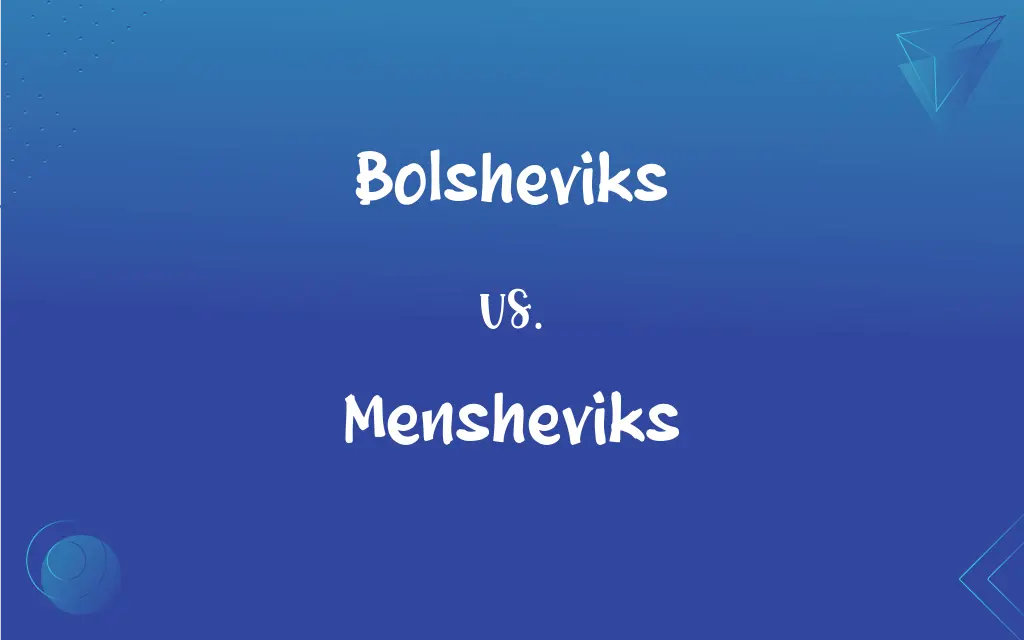Bolsheviks vs. Mensheviks: What's the Difference?
Edited by Aimie Carlson || By Harlon Moss || Published on February 25, 2024
The Bolsheviks were a radical faction advocating immediate socialist revolution; the Mensheviks, a moderate group, supported gradual reforms.

Key Differences
The Bolsheviks and Mensheviks were two factions within the Russian Social Democratic Labour Party, originating from a split in 1903. The Bolsheviks, led by Vladimir Lenin, advocated for a small, disciplined party of professional revolutionaries. In contrast, the Mensheviks, led by Julius Martov, believed in a broad, inclusive party membership.
The Bolsheviks supported the idea of a proletarian revolution and the establishment of a dictatorship of the proletariat. They believed this was essential for achieving socialism. The Mensheviks, however, argued for a democratic and gradual approach, believing socialism could be achieved through parliamentary means and cooperation with other classes.
In terms of strategy, the Bolsheviks favored immediate and decisive action and were willing to use violence to achieve their goals. The Mensheviks, on the other hand, preferred legal and peaceful methods, stressing the importance of building a mass workers' movement and alliances with other socialist groups.
During the 1917 Russian Revolution, these differences became more pronounced. The Bolsheviks led the October Revolution, seizing power and establishing a communist government. The Mensheviks, meanwhile, were marginalized, opposing the Bolsheviks' seizure of power and advocating for a democratic socialist path.
Over time, the Bolsheviks became synonymous with the Communist Party of the Soviet Union, shaping the Soviet state's policies and ideology. The Mensheviks, gradually weakened and suppressed, eventually dissolved, with many members fleeing the country or being persecuted.
ADVERTISEMENT
Comparison Chart
Leadership
Led by Vladimir Lenin.
Led by Julius Martov.
Ideology
Radical, advocating immediate socialist revolution.
Moderate, supporting gradual reforms.
Party Structure
Favored a small, disciplined group of revolutionaries.
Supported a broad, inclusive party membership.
Strategy for Change
Advocated for a proletarian revolution and dictatorship.
Preferred legal, peaceful methods and mass movement.
Role in 1917 Revolution
Led the October Revolution, seizing power.
Opposed Bolshevik seizure of power, marginalized.
ADVERTISEMENT
Bolsheviks and Mensheviks Definitions
Bolsheviks
Bolsheviks, led by Lenin, believed in a small, disciplined party.
The Bolsheviks' strategic focus led to their successful seizure of power in 1917.
Mensheviks
Mensheviks preferred legal and peaceful methods for socialist change.
The Mensheviks focused on building a mass workers' movement through peaceful activism.
Bolsheviks
Bolsheviks were known for their willingness to use violence for political ends.
The Bolsheviks' use of the Red Army was crucial in consolidating their power.
Mensheviks
Mensheviks supported cooperation with other classes and socialist groups.
The Mensheviks' strategy included forming alliances with other democratic forces.
Bolsheviks
Bolsheviks became the ruling party of the Soviet Union post-1917 revolution.
Under Bolshevik leadership, the Soviet Union underwent significant industrial and political changes.
Mensheviks
Mensheviks were a moderate Marxist group favoring gradual socialist reforms.
The Mensheviks advocated for democratic socialism through parliamentary means.
Bolsheviks
Bolsheviks supported the dictatorship of the proletariat to achieve socialism.
The Bolsheviks implemented radical reforms to transform Russia into a socialist state.
Mensheviks
Mensheviks, under Martov, emphasized a broad, inclusive party.
The Mensheviks' openness to diverse membership contrasted sharply with the Bolsheviks.
Bolsheviks
Bolsheviks were a radical Marxist faction advocating for immediate socialist revolution.
The Bolsheviks orchestrated the October Revolution in Russia.
Mensheviks
Mensheviks were marginalized and suppressed after the Bolsheviks' rise to power.
Many Mensheviks were forced to flee Russia following the Bolsheviks' consolidation of power.
Bolsheviks
A member of the left-wing majority group of the Russian Social Democratic Workers' Party that adopted Lenin's theses on party organization in 1903.
Mensheviks
A member of the liberal faction of the Social Democratic Party that struggled against the Bolsheviks before and during the Russian Revolution.
Bolsheviks
A member of the Russian Social Democratic Workers' Party that seized power in that country in November 1917.
Bolsheviks
A member of a Marxist-Leninist party or a supporter of one; a Communist.
Bolsheviks
Often bolshevik An extreme radical
A literary bolshevik. In all senses also called Bolshevist.
Bolsheviks
Plural of bolshevik
FAQs
What did the Bolsheviks advocate for?
The Bolsheviks advocated for immediate socialist revolution and a proletarian dictatorship.
Who led the Bolsheviks?
Vladimir Lenin was the primary leader of the Bolsheviks.
What happened to the Bolsheviks after the 1917 Revolution?
The Bolsheviks became the ruling party of the Soviet Union, shaping its policies.
What was the Bolsheviks' approach to party membership?
The Bolsheviks favored a small, disciplined group of professional revolutionaries.
How did the Bolsheviks view the role of violence in revolution?
The Bolsheviks were willing to use violence to achieve their revolutionary goals.
What were the Mensheviks' key beliefs?
The Mensheviks believed in gradual socialism achieved through democratic and legal means.
How did the Mensheviks view party membership?
The Mensheviks supported a broad, inclusive party with open membership.
Did Bolsheviks and Mensheviks have the same end goal?
Both aimed for socialism, but their methods and approaches were significantly different.
What happened to the Mensheviks post-1917 Revolution?
The Mensheviks were marginalized and suppressed, with many members fleeing or persecuted.
What was the Mensheviks' stance on using violence for political change?
The Mensheviks generally opposed violence, preferring legal and peaceful methods.
How did the Bolsheviks and Mensheviks differ in their approach to alliances?
Bolsheviks were more focused on proletarian leadership, while Mensheviks favored broader alliances.
How did the Russian public perceive the Bolsheviks and Mensheviks?
Public perception varied, with some supporting the radical approach of the Bolsheviks and others favoring the Mensheviks' moderation.
Who led the Mensheviks?
Julius Martov was a prominent leader of the Mensheviks.
Were there ideological overlaps between Bolsheviks and Mensheviks?
Both shared Marxist roots but diverged in interpretation and application.
How did the international socialist community view the Bolsheviks and Mensheviks?
The international socialist community was divided, with some supporting each faction.
Did the Bolsheviks and Mensheviks participate in World War I?
Both factions had different stances on Russia's participation in World War I.
Were there any prominent figures who switched from Mensheviks to Bolsheviks?
Yes, some individuals shifted allegiance, often due to changing political circumstances.
Did the Bolsheviks and Mensheviks have different views on international revolution?
The Bolsheviks were more aggressive in promoting international revolution than the Mensheviks.
What was the legacy of the Bolsheviks and Mensheviks in Russian history?
The Bolsheviks shaped Soviet history, while the Mensheviks' legacy is seen in their democratic socialist ideals.
What caused the split between Bolsheviks and Mensheviks?
The split was caused by differing views on party membership and revolutionary strategy.
About Author
Written by
Harlon MossHarlon is a seasoned quality moderator and accomplished content writer for Difference Wiki. An alumnus of the prestigious University of California, he earned his degree in Computer Science. Leveraging his academic background, Harlon brings a meticulous and informed perspective to his work, ensuring content accuracy and excellence.
Edited by
Aimie CarlsonAimie Carlson, holding a master's degree in English literature, is a fervent English language enthusiast. She lends her writing talents to Difference Wiki, a prominent website that specializes in comparisons, offering readers insightful analyses that both captivate and inform.







































































